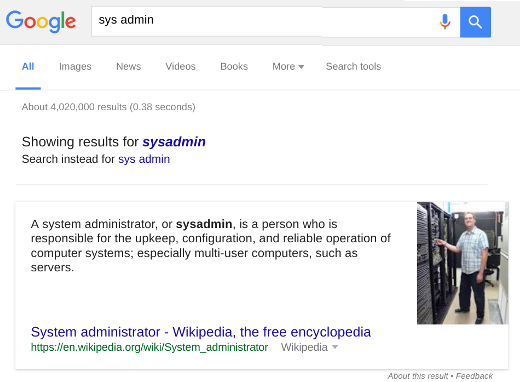[ad_1]
Friends, I have sad news. This week the editors of Opensource.com decided to make a small—yet painful, at least to me—change to our official style guide. Going forward, we will treat “sys admin” as “sysadmin.” I’ll admit that a little piece of me died as I updated our style guide, reluctantly removing the space between sys and admin. My teammates shook their heads and offered no sympathy. One of them sighed and said, “That’s the way the rest of the world does it, Rikki.” Eyes rolled when I gave him my best stink eye and responded between clenched teeth, “But THEY ARE WRONG.”
Having started my career as an editor on Sys Admin Magazine: The Journal for UNIX and Linux systems administrators, I had my pen planted firmly in the “sys admin” camp. I’d already lost the “systems administrators” vs. “system administrators” battle long ago (even though we all know that sys admins … err, excuse me, sysadmins, as the kids say… manage multiple systems), and I’d eventually been dragged over from the UNIX camp to Unix. But I continued defending “sys admin.” Until this week. My colleague pointed out that only ADMIN Magazine (i.e., my former colleagues at Linux New Media and Sys Admin Magazine) uses “sys admin.” Even Google has weighed in on the debate, albeit on the wrong side.

Still, I won’t go out without one final, public fight. My fellow Opensource.com editors agreed that we can revert back to “sys admin” on one condition—if it wins in our reader poll. So what will it be? Will sysadmins get the big squeeze? Or will sys admins get the space they deserve?
My colleague, Jason Baker, offered this counter argument:
The English language is not written and approved by a committee. It is a living language, adapted and remixed every day as it grows and changes to find new words to describe the reality that we live in. There are a few rules, but functionally, they’re more like guidelines. In practice, changes to the English language arise like open source software. New words and phrases are formed around the globe in a distributed way, and a few organically float to the top to emerge as a part of our common vernacular.
When I play the role of writer or editor, I have a responsibility to meet my readers more than halfway and to adapt my writing to speak to them. It’s not that I never break conventions when writing, it’s that when I do, I always try to have a philosophical reason for my choice, and not just that I like my way better.
And so, I simply see no reason to fly in the face of the masses who have clearly adopted sysadmin as their preferred abbreviation. The debate between “sysadmin” and “sys admin” is not philosophical like GNU/Linux versus Linux, nor free software versus open source. It’s a space with no meaning that the world has left behind, and so should we.
[ad_2]
Source link